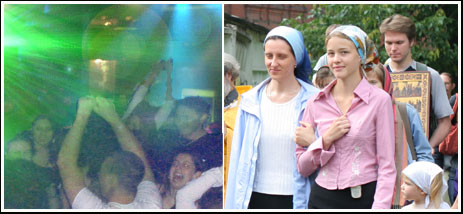Source: “Orthodox Canada”. A Journal of Orthodox Christianity
“Do not be unequally yoked together with unbelievers.”
– 2 Corinthians 6:14
With all the emphasis the Church places on family related rites – marriage, baptism of children, and memorials for departed relatives – any thoughtful reflection brings surprise at the absolute absence of an emphasis on courtship among Orthodox youth. Outside the village context of traditionally Orthodox places, North American parishes, clergy, and families do not as a rule prepare Orthodox youth for courting, or even discuss the impact on married and family life.
The results are too obvious. Orthodox youth display largely the same sexual activity, pregnancy, and abortion rates as other North American youth. So-called “Orthodox” countries such as Greece and Russia have the highest abortion rates in Europe. Pornography is rampant and public in these nations, the effect of a global assault on and abandonment of the Christian lifestyle. Intermarriage rates between Orthodox and heterodox youth (with the exception of Serbs) are at such high levels that the diminishing size of church schools in many older parishes should be little surprise to anyone. All these realities leave many a pious grandparent in a spin; yet panic is not an appropriate reaction for those who trust in Christ.

What are some appropriate ways in which faithful Orthodox families and parishes might address the dilemmas of courting? A few present themselves for our consideration:
1) Pray for your kids and grandkids. God can guide and protect our children at all times, and in all places and situations. We cannot. Be sure to ask the prayers of the saints, especially those known to intercede with Christ for those searching for a faithful and Orthodox spouse.
2) Parishes and priests must address courting/marriage and faith questions from the earliest age, setting out parameters of the Orthodox life. In many parishes, the horse is already out of the barn on this one – most children only come for holidays and dance or language classes, and are not even available in the churches for spiritual guidance. Why would we expect them to turn out any differently than the neighbours, with divorces, infidelities, and addictions to online pornography?
3) Recognize that children aren’t the future of the Church: they are the present. They live their lives right now, have struggles, temptations, and about a million alternatives to Orthodox Christianity, brought to them courtesy of the Internet – and most of these alternatives are bad. If parishes, priests, and parents fail to give authentic Orthodox answers to their children, there are about a thousand other sources of “guidance” – from television to Internet chat to Cosmopolitan magazine – standing by, waiting to offer the advice kids are seeking.
4) A radical adjustment in parish focus for youth is needed: one well-meaning Orthodox gentleman suggested we need more barbeques, along with history and language instruction, ethnic dancing, and cultural festivals. If these form a large and integrated block of activities (with hundreds of Orthodox young people, from whom there is a good chance to find a spouse), then they will work, in producing friendships and relationships, and eventually marriages and families between Orthodox young people of different backgrounds. Usually, however, parishes exist in isolation from each other, particularly from other Orthodox jurisdictions. One remembers hearing an Orthodox man – a faithful, educated professional – saying that he would rather his sons marry outside the Orthodox faith, than marry a member of another Orthodox cultural group. In all likelihood, God will grant him this prayer, and will allow him to live with the consequences.
5) Many Orthodox communities suffer from a brand of racism that goes far beyond colour of skin. It is not difficult to determine if a parish is so afflicted; one may simply ask the faithful, “If you had a choice between your child or grandchild marrying a faithful Orthodox Christian who is a different culture or nationality, or marrying a member of your own culture who has really nothing to do with the Church, which would you choose?” The answers speak volumes. Regrettably, many in the Orthodox immigration to Canada suffer from 19th century Protestant concepts of race and culture: these are false constructs, which fly in the face of the teaching of the Church fathers of the Orthodox Tradition, who consistently teach about our common ancestry, and the fact that racial differentiations are incidental, while differences in faith are critical. Sadly, one hears even pious clergy and laity object to their children marrying outside their culture or race: this attitude is not Orthodox.
The fact is, most parish youth programs provide only a fraction of the social life for only a small segment of Orthodox young people; the rest comes from the popular culture, and from public high schools. It would be very nice if young people knew their culture, heritage language, recipes, and folk traditions, especially Orthodox ones. The reality is, Orthodox Christians are heading in the same direction as Jewish Americans, with their children marrying out of the faith in about ninety percent of cases, and living moral lives that are not very different from their non-Christian peers. With Canadian cultural hegemony as it is, non-Orthodox spouses, even if they formally convert, do not usually become an integral part of Orthodox community life. Italians don’t become Greeks. Chinese don’t become Serbs. Anglos do not become Ukrainians. Do a count at the average Orthodox parish – and tremble.
6) With limited resources, our emphasis must be very specific: spend our time and money on teaching the faith first. The last century has shown that a divided effort produces young people who can dance, sing, dye Easter eggs, eat kolach and spanikopita, but who cannot recognize most icons or follow along in basic services of the Church. They play, but do not pray, at least on a daily basis. (Even atheists pray in a crisis – is that the point we’re at?)
7) Combine our efforts. If we’re serious about our children having friends and by extension, spouses, who hold the same Orthodox faith, we must put inter-Orthodox activities for youth at the centre of our work. The reality is, most Orthodox in Canada are not serious about this, and are drunk with the dream that Costa or Dragica or Lucian or Olga are going to meet some nice young person who will recognize their ethnic dance costume, and fall head over heals – into what? Into a secularized marriage with all the cultural trimmings, and some “Orthodox Christianity on the side with that, thank you very much”. When families live this fantasy, they usually get mixed marriages who are marginal in their faith, at best.
8) Talk about the teachings of the saints on sex and marriage. No questions are more common among Orthodox young people than these. It is really quite encouraging to see, since even those from marginal Church backgrounds really want to hear what the Church has to say – and the Church has a lot to say! The saints talk endlessly about ways to have success in spiritual struggles, temptation, lust, adultery, fornication, self abuse, fantasies, and all the things with which young people (and not so young people) struggle. It is not enough to tell young people to be Greek and be good. It is not enough to tell them to be Serbs and to be safe. It is not enough to tell them to be anything – except Orthodox Christians, striving to live holy lives. Without very specific lessons, from the simple lessons at a young age to more serious lessons at an older age, Orthodox young people will become just what they are often becoming: Orthodox adults without a clue how to raise their kids in the Orthodox faith.
9) In laying the limits for the lives of teens, start when they are born. Parents should know the families of the friends of their child. Visits are nice – and much better if supervised. Socializing in groups is normal, but one must ask: what is the actual goal of dating, one-on-one? I remember asking this question of a group of teens, and they all replied: the goal is fun. When I asked for a more detailed definition of “fun”, they all conceded that the real goal of dating – whether it is spoken or unspoken – is sex. And therein lies the reason parents should steer kids away from the notion of “having a boy/girlfriend”: because as Orthodox Christians, we recognize that courting is to find marriage, and marriage is the place for sex – courting (or “dating”) is simply a recreational sport in the arena of immorality.
10) Watch the bedroom door. The concept of sleepovers, at the homes of friends who live within easy driving distance has always baffled us: if an eight-year-old can sleep over, why can’t a sixteen year old? Of course, with a sixteen year old, the possibilities for troubles are endless, yet many parents lie to themselves about the very real temptations that present themselves to kids, young and old. Having a separate play area – a rec room, a play room, or the livingroom floor – is a key ingredient in laying down parameters that allow children to avoid pitfalls and temptations in later life: the child that plays in their bedroom with friends with the door open when they are five, will be going there when they are fifteen – and will close the door.
11) Isolation. Whether it is a remote corner of the house where a student socializes, or a young person whose electronic communication with friends dominates their time at home, parents should lay down ground rules early on which keep a family knit together, in time, activities, and place. I remember a mother complaining that her teenage son got no homework done, although he never seemed to talk on the phone, never went out, and stayed in his room awake until late at night. She was surprised at the suggestion that they might consider removing the big-screen television and satellite connection access from the room, and placing some limits on his internet access. Isolation from the family had clearly produced a whole new circle of “friends” and social activities for the young man.
12) Modesty. Volumes could be written about the topic of modesty, particularly among young women. In general, three things should be kept in mind. Firstly, as a rule, whatever choice of clothes they make when they are children will become more revealing as they get older, so purchase appropriately when they are young, and speak up about the need for modesty of dress and behaviour. Secondly, if a piece of clothing would seem provocative if worn by an adult, it should not be worn by a child. Thirdly, Orthodox Christians are engaged in the struggle to become holy – like Christ, the Mother of God, and the saints – and their lives and habits should provide a general rule for the conduct of the faithful, young and old alike.
















